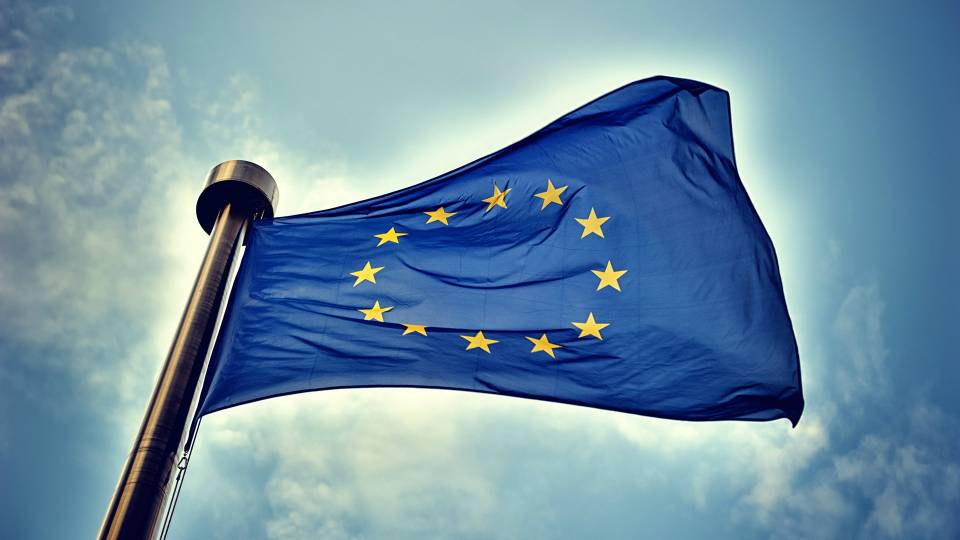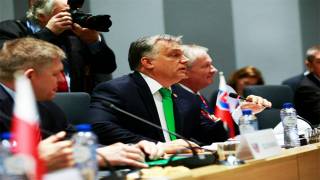European SUPERSTATE to be unveiled: EU nations 'to be morphed into one' post-Brexit
The foreign ministers of France and Germany are due to reveal a blueprint to effectively do away with individual member states in what is being described as an “ultimatum”.
Under the radical proposals EU countries will lose the right to have their own army, criminal law, taxation system or central bank, with all those powers being transferred to Brussels.
Controversially member states would also lose what few controls they have left over their own borders, including the procedure for admitting and relocating refugees.
The plot has sparked fury and panic in Poland - a traditional ally of Britain in the fight against federalism - after being leaked to Polish news channel TVP Info.
The public broadcaster reports that the bombshell proposal will be presented to a meeting of the Visegrad group of countries - made up of Poland, the Czech Republic, Hungary and Slovakia - by German Foreign Minister Frank-Walter Steinmeier later today.
Excerpts of the nine-page report were published today as the leaders of Germany, France and Italy met in Berlin for Brexit crisis talks.
In the preamble to the text the two ministers write: "Our countries share a common destiny and a common set of values ??that give rise to an even closer union between our citizens. We will therefore strive for a political union in Europe and invite the next Europeans to participate in this venture."
The revelations come just days after Britain shook the Brussels establishment by voting to leave the European Union in a move some have predicted could leave to the break-up of the EU.
A number of member states are deeply unhappy about the creeping federalism of the European project with anti-EU sentiments running high in eastern Europe, Scandinavia and France.
Responding to the plot Polish Foreign Minister Witold Waszczykowski raged: "This is not a good solution, of course, because from the time the EU was invented a lot has changed.
“The mood in European societies is different. Europe and our voters do not want to give the Union over into the hands of technocrats.
“Therefore, I want to talk about this, whether this really is the right recipe right now in the context of a Brexit."
There are deep divides at the heart of the EU at the moment over how to proceed with the project in light of the Brexit vote.
Some figures have cautioned against trying to force through further political integration, warning that to do so against the wishes of the European people will only fuel further Eurosceptic feeling.
A few weeks before the Brexit vote European Council president Donald Tusk warned that European citizens did not share the enthusiasm of some of their leaders for “a utopia of Europe without conflicting interests and ambitions, a utopia of Europe imposing its own values on the external world, a utopia of Euro-Asian unity”.
He added: “Increasingly louder are those who question the very principle of a united Europe. The spectre of a break-up is haunting Europe and a vision of a federation doesn’t seem to me to be the best answer to it.”
His view was backed up by the leader of the eurozone countries, Dutch politician Jerome Dijsselbloem, who added: “In the eurozone some are pushing for a completion of the monetary union by creating a full political union, a euro area economic government or even a euro budget… to me it is obvious.
“We need to strengthen what we have and finish it, but let’s not build more extensions to the European house while it is so unstable.”
Meanwhile Lorenzo Condign, the former director general of Italy’s treasury, has said it is nearly impossible to see Europe opting for more integration at such a time of upheaval.
He said: “It seems difficult to imagine that the rest of the EU will close ranks and move in the direction of greater integration quickly. Simply, there is no political will.
“Indeed, the risk is exactly the opposite - namely that centrifugal forces will prevail and make integration even more difficult.”
But others see the Brexit vote as an opportunity to push ahead with the European elite’s long-cherished dream of creating a United States of Europe.
Spain’s foreign minister Jose Manuel Garcia-Margallo has called for “more Europe” whilst Italy’s finance minister, Carlo Padoan, is advocating a common budget for the eurozone states.
And Emmanuel Macron, France’s economy minister, wants to go even further and set up a common eurozone treasury which would oversee the permanent transfer of funds from wealthier northern Europe to shore up Mediterranean economies.






















